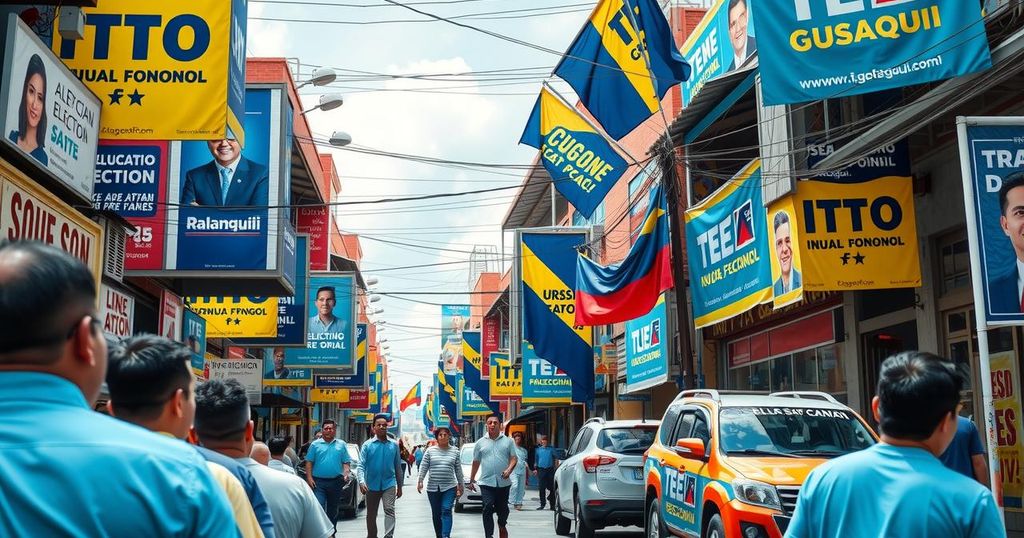Ecuadorian presidential candidates Daniel Noboa and Luisa Gonzalez make final appeals to voters before a tight election on Sunday. Noboa focuses on crime and economic issues, while Gonzalez emphasizes support for women. Polls suggest a close race, setting the stage for a potential shift in political direction. Over 14 million voters will decide the future leadership amidst rising concerns of violence and political fraud.
In the final hours of campaigning, Ecuador’s incumbent president, Daniel Noboa, and his leftist challenger, Luisa Gonzalez, presented compelling appeals to voters. Their discussions predominantly revolved around employment opportunities, rising crime rates, and strategies to engage women voters effectively. As the nation prepares for a critical election on Sunday, over 14 million Ecuadorans will determine the future leadership of their troubled country.
Noboa, aged 37, faces 47-year-old Gonzalez, who aspires to be the first female president of Ecuador. Following Friday’s mandatory campaign silence and a ban on alcohol, the government has restricted foreign entry to mitigate any disruptions. With both candidates highlighting significant issues, voters will have a crucial role in shaping policies in a nation grappling with violence and instability.
Adela, a 29-year-old mother, voiced her concerns stating, “There is no work and insecurity is on the rise. They always make promises, but when they are elected, they never fulfil them.” If Noboa is re-elected, he is likely to implement stringent measures against increasing violence linked to the drug trade, which has escalated significantly this year.
Noboa has proposed deploying US troops to combat the numerous drug cartels operating within Ecuador. Conversely, a victory for Gonzalez could indicate a pivot to the left, potentially straining relations with the United States and its current administration. Gonzalez’s close affiliation with former president Rafael Correa, now living in exile, exemplifies this shift in political stance.
Polls indicate a highly competitive race, evidenced by a mere 17,000 votes separating the two candidates in February’s election round. The second round promises heightened voter participation, particularly among those previously supporting eliminated candidates. Gonzalez has recently attracted the support of indigenous leader Leonidas Iza, hinting at a unified voter base, although uncertainty remains on how many will stay loyal.
Both candidates concluded their campaigns in Guayaquil, where Gonzalez specifically advocated for financial support for women, emphasizing that “violence, poverty, and unemployment has hit us women hardest.” Despite Noboa’s wealth and power, he positions himself as an outsider advocating for change.
Amid concerns of potential fraud claims from a close election outcome, analysts warn a slim victory could lead to governance challenges. Simon Pachano, from the FLASCO social sciences institute, noted that if the result is closely contested, the government would face significant opposition from nearly half the electorate, complicating its ability to govern effectively.
The Ecuadorian presidential election is poised to be a decisive moment for the nation, with candidates Daniel Noboa and Luisa Gonzalez representing divergent paths forward. Noboa’s focus on law enforcement and American assistance contrasts sharply with Gonzalez’s leftist policies and emphasis on social issues. As over 14 million voters prepare to make their choice, the potential for a tight election outcome raises concerns regarding governance stability and public trust in the electoral process.
Original Source: www.rfi.fr




